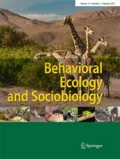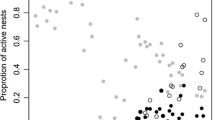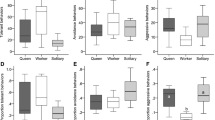Abstract
How mutual tolerance is produced, and the role of social environment in inducing cooperation in social groups, remains unstudied in many simple societies. In particular, maternal and sibling care and conflict are challenging to manipulate experimentally for many species. Most bees are solitary, but mothers of the eastern small carpenter bee, Ceratina calcarata, engage in prolonged care of offspring, and are therefore subsocial. Females form social associations of parents and a single generation of offspring, including a smaller dwarf eldest daughter (DED) who forages and feeds her adult siblings. Adult assemblages of C. calcarata present a unique opportunity to study the effect of social environment on cooperation and sibling care in an otherwise subsocial bee. To study how social environment influences foraging and intranidal behaviors, observation nests were constructed, and unaltered as a control, or treated by removing either only mothers or both mothers and DEDs. Nests were video-recorded for 464 h during summer (July–August) parent-adult offspring cohabitation. Individual and interactive behaviors were scored. In the absence of mothers, offspring were more tolerant, suggesting that a hierarchy between mother and offspring produces less tolerance between offspring. Aggression was only significantly greater in the absence of both mother and DED. We found that foraging was the lowest in the absence of mothers, and persisted in the absence of both mother and DED. This study provides the first detailed account of the intranidal behaviors of this species and experimentally reveals how social environment influences cooperative behavior.
Significance statement
Understanding how particular life histories, such as extended parental care, may set the stage for more complex social behaviors, such as sibling cooperation, is critical to understanding how alloparental care evolves in group living organisms. Most species exhibiting parental care and sibling cooperation are difficult to manipulate experimentally. Though relatively uncommon in invertebrates, extended parental care is frequently found in small carpenter bees that can be carefully observed within their nests and foraging. Here, we examine how the absence of mothers and worker-like daughters influences the social behavior of related adults living in close group association of such bees. This experiment presents an intranidal study of a subsocial bee’s behavior, and our results suggest that mothers play a dramatic role regulating social behavior. Furthermore, our results show that siblings are more tolerant in the absence of mothers, suggesting that mothers may maintain social hierarchies among offspring. Siblings may interact more aggressively and more frequently as they negotiate intranidal and foraging tasks in the absence of maternal care.





Similar content being viewed by others
References
Arneson L, Wcislo WT (2003) Dominant-subordinate relationships in a facultatively social, nocturnal bee, Megalopta genalis (Hymenoptera: Halictidae). J Kansas Entomol Soc:183–193
Arsenault SV, Brendan HG, Rehan SM (2018) The effect of maternal care on gene expression and DNA methylation in a subsocial bee. Nat Commun 9:1–9. https://doi.org/10.1038/s41467-018-05903-0
Boomsma JJ, Eickwort GC (1993) Colony structure, provisioning and sex allocation in the sweat bee Halictus ligatus (Hymenoptera: Halictidae). Biol J Linn Soc 48:355–377. https://doi.org/10.1111/j.1095-8312.1993.tb02097.x
Breed MD, Page RE Jr (eds) (1989) Genetic basis for division of labor in an insect society. In: The genetics of social evolution. Westview Press, Boulder, pp 61–80
Breed MD, Silverman JM, Bell WJ (1978) Agonistic behavior, social interactions, and behavioral specialization in a primitively eusocial bee. Insect Soc 25:351–364. https://doi.org/10.1007/BF02224299
Brooks ME, Kristensen K, van Benthem KJ et al (2017) glmmTMB balances speed and flexibility among packages for zero-inflated generalized linear mixed modeling. R J 9:378–400
Brothers DJ, Michener CD (1974) Interactions in colonies of primitively social bees: III. Ethometry of division of labor in Lasioglossum zephyrum (Hymenoptera: Halictidae). J Comp Physiol 90:129–168. https://doi.org/10.1007/BF00694482
Buckle GR (1982) Queen-worker behavior and nestmate interactions in young colonies of Lasioglossum Zephyrum. Insect Soc 29:125–137. https://doi.org/10.1007/BF02228746
Buckle GR (1985) Increased queen-like behaviour of workers in large colonies of the sweat bee Lasioglossum zephyrum. Anim Behav 33:1275–1280. https://doi.org/10.1016/S0003-3472(85)80187-1
Calabi P (1988) Behavioral flexibility in Hymenoptera: a re-examination of the concept of caste. Advances in Myrmecology. E.J. Brill, New York, pp 237–258
Caldji C, Tannenbaum B, Sharma S, Francis D, Plotsky PM, Meaney MJ (1998) Maternal care during infancy regulates the development of neural systems mediating the expression of fearfulness in the rat. Proc Natl Acad Sci U S A 95:5335–5340. https://doi.org/10.1073/pnas.95.9.5335
Cameron SA, Jost MC (1998) Mediators of dominance and reproductive success among queens in the cyclically polygynous Neotropical bumble bee Bombus atratus Franklin. Insect Soc 45:135–149. https://doi.org/10.1007/s000400050075
Chandrashekara K, Gadagkar R (1991) Behavioural castes, dominance and division of labour in a primitively eusocial wasp. Ethology 87:269–283. https://doi.org/10.1111/j.1439-0310.1991.tb00252.x
Costa JT (2006) The other insect societies. Belknap Press of Harvard University Press. Mass, Cambridge
Creel S, Creel N, Wildt DE, Monfort SL (1992) Behavioural and endocrine mechanisms of reproductive suppression in Serengeti dwarf mongooses. Anim Behav 43:231–245. https://doi.org/10.1016/S0003-3472(05)80219-2
Dropkin JA, Gamboa GJ (1981) Physical comparisons of foundresses of the paper wasp, Polistes metricus (Hymenoptera: Vespidae). Can Entomol 113:457–461. https://doi.org/10.4039/Ent113457-6
Emlen ST (1984) Cooperative breeding in birds and mammals. In: Krebs JR, Davies NB (eds) Behavioural ecology: an evolutionary approach, 2nd edn. Blackwell Science, Cambridge, pp 305–339
Enquist M, Ljungberg T, Zandor A (1987) Visual assessment of fighting ability in the cichlid fish Nannacara anomala. Anim Behav 35:1262–1264. https://doi.org/10.1016/S0003-3472(87)80189-6
Fewell JH, Page RE (2000) Colony-level selection effects on individual and colony foraging task performance in honeybees, Apis mellifera L. Behav Ecol Sociobiol 48:173–181. https://doi.org/10.1007/s002650000183
Fish EW, Shahrokh D, Bagot R et al (2006) Epigenetic programming of stress responses through variations in maternal care. Ann N Y Acad Sci 1036:167–180. https://doi.org/10.1196/annals.1330.011
Gadagkar R (1980) Dominance hierarchy and division of labour in the social wasp Ropalida Marginata (Lep.). Curr Sci India 772–775
Gamboa GJ, Heacock BD, Wiltjer SL (1978) Division of labor and subordinate longevity in foundress associations of the paper wasp, Polistes metricus (Hymenoptera: Vespidae). J Kansas Entomol Soc 343–352
Greenberg L, Buckle GR (1981) Inhibition of worker mating by queens in a sweat bee, Lasioglossum zephyrum. Insect Soc 28:347–352. https://doi.org/10.1007/BF02224192
Hartig F (2020) Residual diagnostics for hierarchical (multi-level/mixed) regression models. R package version 0.3.3.0. http://florianhartig.github.io/DHARMa/. Accessed 8 Jan 2021
Hemelrijk CK (2000) Towards the integration of social dominance and spatial structure. Anim Behav 59:1035–1048. https://doi.org/10.1006/anbe.2000.1400
Hilbe JM (2011) Negative binomial regression. Cambridge University Press. Cambridge University Press, Cambridge, UK
Hogendoorn K, Velthuis HHW (1999) Task allocation and reproductive skew in social mass provisioning carpenter bees in relation to age and size. Insect Soc 46:198–207. https://doi.org/10.1007/s000400050135
Jandt JM, Tibbetts EA, Toth AL (2014) Polistes paper wasps: a model genus for the study of social dominance hierarchies. Insect Soc 61:11–27. https://doi.org/10.1007/s00040-013-0328-0
Jeanson R, Clark RM, Holbrook CT et al (2008) Division of labour and socially induced changes in response thresholds in associations of solitary halictine bees. Anim Behav 76:593–602. https://doi.org/10.1016/j.anbehav.2008.04.007
Johnson MD (1988) The relationship of provision weight to adult weight and sex ratio in the solitary bee, Ceratina calcarata. Ecol Entomol 13:165–170. https://doi.org/10.1111/j.1365-2311.1988.tb00344.x
Kapheim KM, Bernal SP, Smith AR, Nonacs P, Wcislo WT (2011) Support for maternal manipulation of developmental nutrition in a facultatively eusocial bee, Megalopta genalis (Halictidae). Behav Ecol Sociobiol 65:1179–1190. https://doi.org/10.1007/s00265-010-1131-9
Koenig WD, Dickinson JL (2004) Ecology and evolution of cooperative breeding in birds. Cambridge University Press, Cambridge
Kramer J, Thesing J, Meunier J (2015) Negative association between parental care and sibling cooperation in earwigs: a new perspective on the early evolution of family life? J Evol Biol 28:1299–1308. https://doi.org/10.1111/jeb.12655
Kukuk P, May B (1991) Colony dynamics in a primitively eusocial halictine bee Lasioglossum (Dialictus) zephyrum (Hymenoptera: Halictidae). Insect Soc 38:171–188. https://doi.org/10.1007/BF01240967
Lenth R (2020) Emmeans: estimated marginal means, aka least-squares means. https://CRAN.R-project.org/package=emmeans. Accessed 8 Jan 2021
Michener CD (1974) The social behaviour of the bees: a comparative study. Harvard University Press, Cambridge
Michener CD (1990) Reproduction and castes in social halictine bees. In: Social insects: an evolutionary approach to castes and reproduction. Springer, Berlin, pp 77–121
Michener CD, Brothers DJ (1974) Were workers of eusocial Hymenoptera initially altruistic or oppressed? Proc Natl Acad Sci U S A 71:671–674. https://doi.org/10.1073/pnas.71.3.671
Mikát M, Černá K, Straka J (2016) Major benefits of guarding behavior in subsocial bees: implications for social evolution. Ecol Evol 6:6784–6797. https://doi.org/10.1002/ece3.2387
Mikát M, Franchino C, Rehan SM (2017) Sociodemographic variation in foraging behavior and the adaptive significance of worker production in the facultatively social small carpenter bee, Ceratina calcarata. Behav Ecol Sociobiol 71:135. https://doi.org/10.1007/s00265-017-2365-6
Mikát M, Janošík L, Černá K, Matoušková E, Hadrava J, Bureš V, Straka J (2019) Polyandrous bee provides extended offspring care biparentally as an alternative to monandry based eusociality. Proc Natl Acad Sci U S A 116:6238–6243. https://doi.org/10.1073/pnas.1810092116
Mulder RA, Langmore NE (1993) Dominant males punish helpers for temporary defection in superb fairy-wrens. Anim Behav 45:830–833. https://doi.org/10.1006/anbe.1993.1100
Packer L (1986) Multiple-foundress associations in a temperate population of Halictus ligatus (Hymenoptera; Halictidae). Can J Zool 64:2325–2332. https://doi.org/10.1139/z86-346
Packer L (2006) Use of artificial arenas to predict the social organisation of halictine bees: data for fourteen species from Chile. Insect Soc 53:307–315. https://doi.org/10.1007/s00040-006-0873-x
Page RE, Robinson GE (1991) The genetics of division of labour in honey bee colonies. Advances in insect physiology. Elsevier, In, pp 117–169
Pardi L (1948) Dominance order in Polistes wasps. Physiol Zool 21:1–13. https://doi.org/10.1086/physzool.21.1.30151976
Pratt AE, McLain DK, Lathrop GR (2003) The assessment game in sand fiddler crab contests for breeding burrows. Anim Behav 65:945–955. https://doi.org/10.1006/anbe.2003.2152
Pratte M (1989) Foundress association in the paper wasp Polistes dominulus Christ. (Hymen. Vesp.). Effects of dominance hierarchy on the division of labour. Behaviour 208–219. https://doi.org/10.1163/156853989X00664
Reeve HK (1992) Queen activation of lazy workers in colonies of the eusocial naked mole-rat. Nature 358:147–149. https://doi.org/10.1038/358147a0
Reeve HK, Gamboa GJ (1987) Queen regulation of worker foraging in paper wasps: a social feedback control system (Polistes fuscatus, Hymenoptera: Vespidae). Behaviour 102:147–167. https://doi.org/10.1163/156853986X00090
Rehan SM, Berens AJ, Toth AL (2014) At the brink of eusociality: transcriptomic correlates of worker behaviour in a small carpenter bee. BMC Evol Biol 14:260. https://doi.org/10.1186/s12862-014-0260-6
Rehan SM, Richards MH (2010) Nesting biology and subsociality in Ceratina calcarata (Hymenoptera: Apidae). Can Entomol 142:65–74. https://doi.org/10.4039/n09-056
Rehan SM, Richards MH (2013) Reproductive aggression and nestmate recognition in a subsocial bee. Anim Behav 85:733–741. https://doi.org/10.1016/j.anbehav.2013.01.010
Reyer H-U, Dittami JP, Hall MR (1986) Avian helpers at the nest: are they psychologically castrated? Ethology 71:216–228. https://doi.org/10.1111/j.1439-0310.1986.tb00585.x
Richards MH, Packer L (1994) Trophic aspects of caste determination in Halictus ligatus, a primitively eusocial sweat bee. Behav Ecol Sociobiol 34:385–391. https://doi.org/10.1007/BF00167329
Rutte C, Taborsky M, Brinkhof MWG (2006) What sets the odds of winning and losing? Trends Ecol Evol 21:16–21. https://doi.org/10.1016/j.tree.2005.10.014
Sakagami SF (1977) Some presumably presocial habits of Japanese Ceratina bees, with notes on various social types in Hymenoptera. Insect Soc 24:319–343. https://doi.org/10.1007/BF02223784
Sakagami SF, Maeta Y (1987) Sociality, induced and/or natural, in the basically solitary small carpenter bees (Ceratina). In: Ito Y, Brown J, Kikkawa J (eds) Animal societies: theories and facts. Japanese Scientific Societies Press, pp 1–16
Sakagami SF, Maeta Y (1989) Compatibility and incompatibility of solitary life with eusociality in two normally solitary bees Ceratina japonica and Ceratina okinawana (Hymenoptera, Apoidea), with notes on the incipient phase of eusociality. Jpn J Entomol 57:417–439
Sakagami SF, Maeta Y, Saito K, Hyodo K (1993) Diapause and non-delayed eusociality in a univoltine and basically solitary bee, Ceratina japonica (Hymenoptera, Anthophoridae): I. Diapause Termination by cooling and application of juvenile hormone analog. Jpn J Entomol 61:443–457
Schwarz MP, Woods RE (1994) Order of adult eclosion is a major determinant of reproductive dominance in the allodapine bee Exoneura bicolor. Anim Behav 47:373–378. https://doi.org/10.1006/anbe.1994.1051
Shell WA, Rehan SM (2018) The price of insurance: costs and benefits of worker production in a facultatively social bee. Behav Ecol 29:204–211. https://doi.org/10.1093/beheco/arx146
Smith IP, Huntingford FA, Atkinson RJA, Taylor AC (1994) Strategic decisions during agonistic behaviour in the velvet swimming crab, Necora puber (L.). Anim Behav 47:885–894. https://doi.org/10.1006/anbe.1994.1120
Smith AR, Kapheim KM, O’Donnell S, Wcislo WT (2009) Social competition but not subfertility leads to a division of labour in the facultatively social sweat bee Megalopta genalis (Hymenoptera: Halictidae). Anim Behav 78:1043–1050. https://doi.org/10.1016/j.anbehav.2009.06.032
Smith JM, Parker GA (1976) The logic of asymmetric contests. Anim Behav 24:159–175. https://doi.org/10.1016/S0003-3472(76)80110-8
Stacey PB, Koenig WD (1992) Stacey, P. B. and Koenig, W. D. 1990. Cooperative breeding In Birds: long term studies of ecology and behaviour. Cambridge University Press, Oxford, UK
Sullivan J, Strassmann J (1984) Physical variability among nest foundresses in the polygynous social wasp, Polistes annularis. Behav Ecol Sociobiol 15:249–256. https://doi.org/10.1007/BF00292986
Taborsky M (1984) Broodcare helpers in the cichlid fish Lamprologus brichardi: their costs and benefits. Anim Behav 32:1236–1252. https://doi.org/10.1016/S0003-3472(84)80241-9
Tallamy DW, Wood TK (1986) Convergence patterns in subsocial insects. Annu Rev Entomol 31:369–390. https://doi.org/10.1146/annurev.en.31.010186.002101
Tibbetts EA, Sheehan MJ (2012) The effect of juvenile hormone on Polistes wasp fertility varies with cooperative behavior. Horm Behav 61:559–564. https://doi.org/10.1016/j.yhbeh.2012.02.002
Wcislo WT (1997) Social interactions and behavioral context in a largely solitary bee, Lasioglossum (Dialictus) figueresi (Hymenoptera, Halictidae). Insect Soc 44:199–208. https://doi.org/10.1007/s000400050041
West MJ (1967) Foundress associations in polistine wasps: dominance hierarchies and the evolution of social behavior. Science 157:1584–1585. https://doi.org/10.1126/science.157.3796.1584
West-Eberhard MJ (1969) The social biology of polistine wasps. Museum of Zoology, University of Michigan, Michigan
Widowski TM, Ziegler TE, Elowson AM, Snowdon CT (1990) The role of males in the stimulation of reproductive function in female cotton-top tamarins, Saguinus o. oedipus. Anim Behav 40:731–741. https://doi.org/10.1016/S0003-3472(05)80702-X
Wickham H, Romain F, Lionel H, Kirill Müller (2020) dplyr: A grammar of data manipulation. R package version 0.8.4. https://CRAN.Rproject.org/package=dplyr. Accessed 8 Jan 2021
Wilson EO (1971) The insect societies. Belknap Press of Harvard University Press. Mass, Cambridge
Withee JR, Rehan SM (2016) Cumulative effects of body size and social experience on aggressive behaviour in a subsocial bee. Behaviour 153:1365–1385. https://doi.org/10.1163/1568539X-00003382
Zuur AF (2009) Mixed effects models and extensions in ecology with R. Springer, New York
Zuur AF, Ieno EN (2016) A protocol for conducting and presenting results of regression-type analyses. Methods Ecol Evol 7:636–645. https://doi.org/10.1111/2041-210X.12577
Acknowledgements
We thank Stephanie Gardener, Jacob Withee, Alessia Schembri, and Shelly Bard for assistance scoring video recordings, and Curtis Johnson for the access to his tools and workshop for nest box construction.
Funding
This study was funded by a Queen Elizabeth II Graduate Scholarship in Science and Technology to JH, NSF graduate research fellowship to WAS, Hamel Center for Undergraduate Research fellowship to HKP, and NSERC Discovery Grant to SMR.
Author information
Authors and Affiliations
Corresponding author
Additional information
Communicated by O. Rueppell
Publisher’s note
Springer Nature remains neutral with regard to jurisdictional claims in published maps and institutional affiliations.
Rights and permissions
About this article
Cite this article
Huisken, J.L., Shell, W.A., Pare, H.K. et al. The influence of social environment on cooperation and conflict in an incipiently social bee, Ceratina calcarata. Behav Ecol Sociobiol 75, 74 (2021). https://doi.org/10.1007/s00265-021-03011-6
Received:
Revised:
Accepted:
Published:
DOI: https://doi.org/10.1007/s00265-021-03011-6




